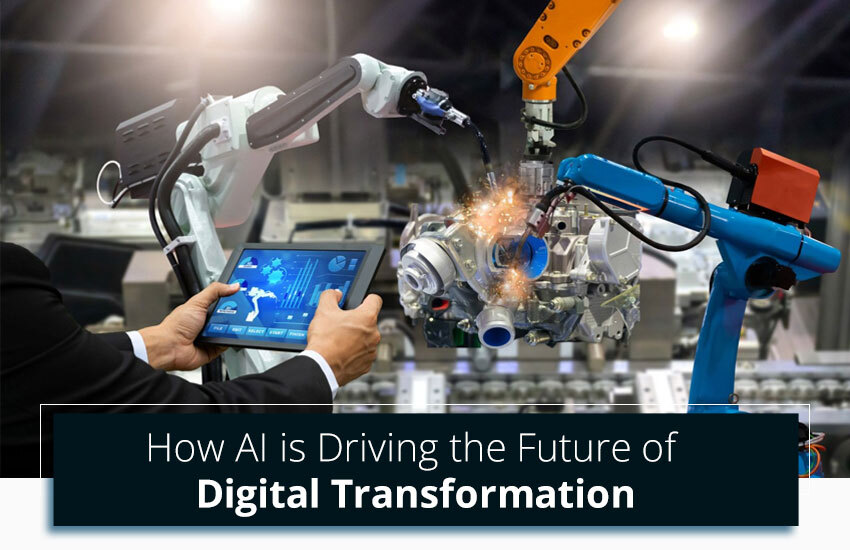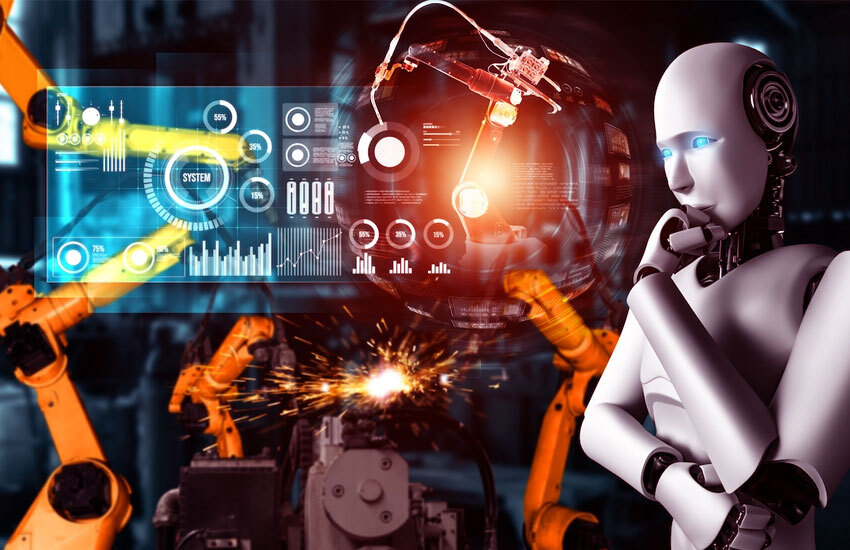
Increasingly, the incorporation of Artificial Intelligence (AI) into digital transformation plans is defining the future of business. Artificial Intelligence (AI) is at the forefront of transforming industries, from manufacturing to consumer engagement, allowing businesses to improve client experiences, optimize performance, and streamline operations. Businesses enter a new era of efficiency and innovation as they embrace AI-driven solutions, opening up previously unattainable opportunities. We'll examine how AI is propelling digital transformation in the future, its importance in transforming sectors, and its numerous advantages in this blog.
Artificial intelligence encompasses methods and technologies that allow machines to carry out tasks like learning, problem-solving, data processing, and decision-making that would normally need human intelligence. AI is essential to digital transformation because it improves business processes, boosts productivity, and makes intelligent automation possible. AI is essential to building smarter, more flexible businesses, whether that be in supply chain optimization, predictive maintenance, or consumer interaction.
Despite their frequent interchangeability, automation and artificial intelligence are two different ideas. While AI refers to systems that can learn from data, adjust to changing circumstances, and make well-informed decisions, automation is the use of technology to carry out repetitive, rule-based operations without human intervention. Automation is essentially a subset of artificial intelligence (AI), which includes self-learning and decision-making in addition to basic task repetition.
Particularly for sectors like manufacturing, where it makes smart manufacturing solutions and AI-powered quality control systems possible, artificial intelligence plays a significant role in digital transformation. AI enables businesses to improve operational efficiency, automate intricate processes, and provide more individualized consumer experiences. AI-powered digital transformation allows companies to:
Improve decision-making: AI systems are able to examine big datasets, find hidden patterns, and offer practical advice to help make better decisions.
Process optimization and automation: AI-driven business process automation has made it possible to smoothly automate jobs that previously required human interaction, which lowers errors and boosts productivity.
Achieve flexibility and scalability: AI systems can quickly deliver individualized solutions, scale across industries, and adjust to shifting demands.
AI is especially useful for firms that depend on data-driven decision-making because of its predictive powers. In addition to reducing risks and optimizing opportunities, AI can predict future trends, anticipate client needs, and manage supply chains.
AI has many advantages for firms that improve customer experiences and operational capacities. Businesses can do the following by integrating AI into their digital transformation strategies:
Boost operational efficiency: AI in manufacturing lowers human error, automates repetitive operations, and streamlines production lines. By predicting when equipment may break, predictive maintenance solutions can avoid expensive downtime.
Read our blog, “Read our blog, “AI in Manufacturing: Shaping the Future of Smarter Factories” to understand more about “AI in Manufacturing”!
Boost consumer engagement: Businesses may provide real-time customer support with AI tools like chatbots and virtual assistants, which increases customer happiness and retention.
Make the best decisions possible: AI offers insights through data analysis and predictive analytics that assist companies in making better, data-driven decisions.
Improve product and service innovation: By providing deeper insights into consumer preferences, market trends, and product performance, artificial intelligence (AI) speeds up the AI-driven product lifecycle management (PLM) process and enables more intelligent product development.
Cut costs: By simplifying procedures and getting rid of inefficiencies, automation and AI-powered solutions, such supply chain optimization with AI, can help firms cut operating costs.
AI is also essential for raising performance indicators. AI systems, for instance, may measure CTR (click-through rate), evaluate client interaction, and analyze conversion rates, all of which can increase return on investment and boost customer happiness.

AI is propelling digital transformation projects by providing companies with automated, intelligent solutions that improve scalability, agility, and efficiency.
The following are a few ways AI propels change:
AI-Powered Digital Transformation: AI speeds up an organization's path to digital maturity by allowing it to adopt data-driven decision-making and intelligent automation.
AI Integration in Manufacturing Processes: The design, production, and delivery of products are being revolutionized by the integration of AI systems into manufacturing activities. Manufacturing processes are becoming more effective, cutting costs, and producing higher-quality products thanks to AI-powered quality control systems and predictive maintenance.
AI-Powered Smart Manufacturing: AI's capacity to streamline production processes and interface with IoT devices, enabling real-time monitoring and predictive maintenance capabilities, is directly responsible for the growth of smart manufacturing solutions.
AI-driven solutions give businesses the ability to rethink entire business models and workflows in addition to automating existing operations, giving them a competitive edge in the ever evolving digital landscape.
AI and cloud computing work well together to enable companies to speed their digital transformation projects. The processing power, scalability, and flexibility required to enable large-scale AI applications are offered by cloud-based AI solutions. Businesses can improve their capacity to make data-driven decisions by utilizing cloud services to store and analyze enormous volumes of data in real-time.
For example, AI and cloud computing in digital transformation allow companies to:
Remotely store and process data to facilitate team collaboration and accessibility.
Scale AI applications to satisfy companies' expanding needs, particularly in sectors like manufacturing digital transformation with AI.
Use AI models to drive corporate intelligence and performance optimization by analyzing data and producing actionable insights.
Businesses now have cutting-edge tools for ongoing innovation, improving consumer experiences, and increasing market agility thanks to the combination of AI and cloud computing.
AI is being used by numerous companies in a variety of industries to propel their digital transformation initiatives. Examples of AI uses in the real world include:
AI in Manufacturing: Through predictive maintenance, businesses are using AI to increase production efficiency and decrease downtime. AI-driven systems extend the lifespan of equipment and decrease the need for reactive maintenance by monitoring gear in real-time and anticipating any faults before they happen.
AI in Product Development: Businesses can use AI to improve design processes, model product performance, and shorten time-to-market by incorporating it into product lifecycle management (PLM).
Customer Engagement: Businesses may provide individualized experiences, expedite customer service, and increase customer retention rates by utilizing AI-driven solutions such as chatbots and virtual assistants. Additionally, these solutions can manage large numbers of client requests without sacrificing service quality.
Supply Chain Optimization: AI is essential to supply chain optimization because it helps companies manage inventories, forecast demand, and streamline operations. Real-time data analysis by AI-powered systems guarantees on-time product delivery while cutting waste and operating expenses.
With the potential to further transform industries, artificial intelligence has a very bright future in digital transformation. Digital strategies will probably be shaped more and more by emerging technologies like generative AI and multimodal AI. Among the important trends to watch for are:
Increased AI-Cloud Integration: As more companies adopt cloud-based solutions, AI will be seamlessly integrated with cloud computing, improving performance and scalability.
Increased Personalization of Customer Experiences: AI's capacity to evaluate consumer information and forecast requirements will lead to even more hyper-personalization in sales, marketing, and customer support.
AI for Innovation: As AI develops, it will help create new products by improving testing, design, and market distribution tactics.
In conclusion, artificial intelligence (AI) is propelling the next wave of digital transformation by giving companies the means to streamline processes, provide individualized experiences, and maintain competitiveness in a market that is constantly evolving. Businesses may anticipate more effective procedures, more intelligent decision-making, and creative solutions that will help them advance into the future when AI is at the center of digital strategy. AI has the ability to revolutionize a wide range of industries, including marketing, manufacturing, and customer service. The future of digital transformation with AI is promising.
Let’s connect: www.modelcamtechnologies.com
Email: sales@modelcamtechnologies.com
Mobile no : +91 8237016167
©Copyright 2025. All rights reserved by Modelcam Technologies Private Limited PUNE.